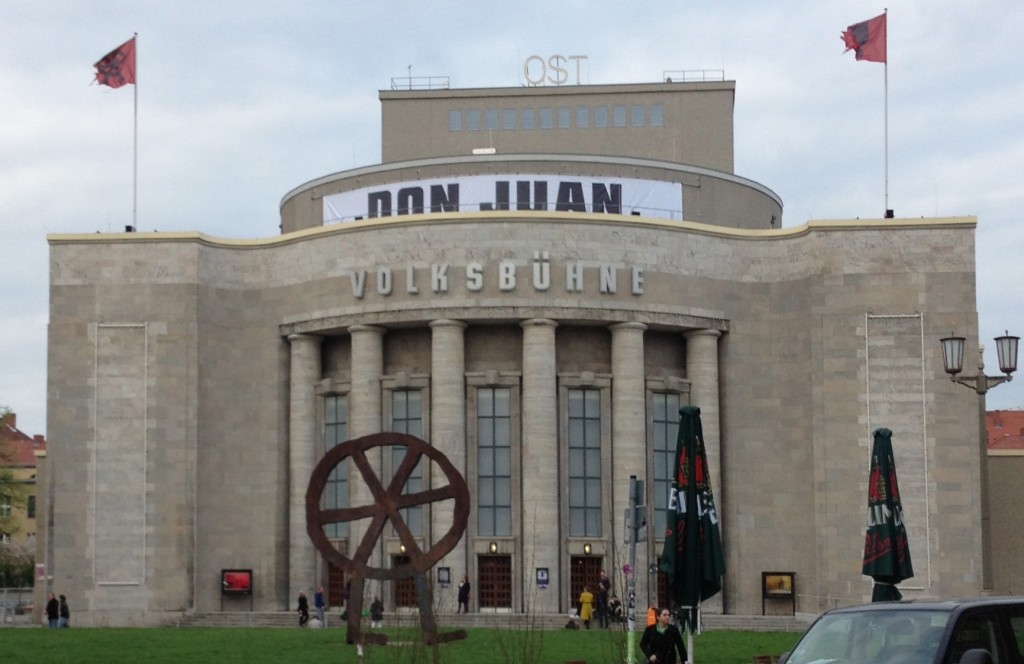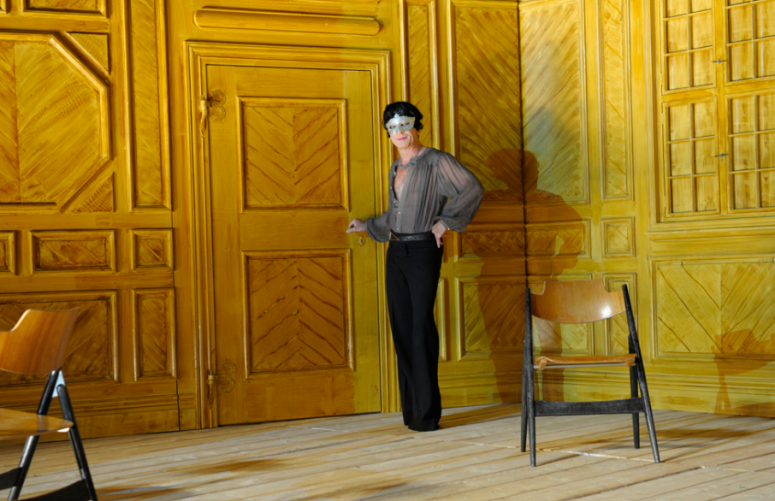Berlin, Day 1: Don Juan (Moliere/Pollesch), Volksbühne
Off the plane, into a theatre: and how. The Volksbühne, perhaps the most iconoclastic of Berlin’s publicly funded theatres, launched a three-part Moliere project this year. Of the three productions, one (The Miser, directed by Frank Castorf) is advertised as “by” Moliere; one (The Imaginary Invalid, directed by Martin Wuttke, who also plays the lead in all three shows) is billed as “after” Moliere; and this one, Don Juan, says it’s “by” Rene Pollesch, “after” Moliere. Exactly what those distinction mean in practice, if anything, I’ll discuss with one of the theatre’s dramaturges later this week. But for Pollesch’s production, the “after” clearly signifies in at least two ways: this is a loose adaptation of Moliere’s play; but it’s also a Don Juan who is “after” Moliere’s in the sense that he’s what may have become of the character if he hadn’t dropped into hell at the end of the play: more faded, more disillusioned, more weary — and, kind of remarkably, significantly less cynical.
Even saying that there is a Don Juan in this Don Juan is a total misrepresentation of the play, though, and of Pollesch’s theatre in general. There is such a character at the beginning of the show, and he’s played by Wuttke; but then Wuttke becomes Wuttke, Donna Elvira very quickly becomes Lilith Stangenberg, and I’m not sure anyone else is ever a recognizable “character” in any real sense. Don Juan, meanwhile, keeps reappearing as an addressee, as the figure onto whom others project desires or blame, but the bodies that stand in for that figure keep switching (and keep switching gender, and sex). Pollesch is famous for staging high theory, and there is a good deal of that here, in the form of a fairly loose exploration of the Foucauldian notion of heterotopia — and the call for a genuine heterosexuality, a kind of polymorphousness instead of a restrictive heteronormativity that homogenizes sexuality (the punning on the work done by the homo- and hetero- prefixes is entertaining, and not entirely devoid of punch, though I’m not sure if the joke is Pollesch’s or Foucault’s — or someone else’s?). The play repeatedly, and hilariously, stages and deconstructs characters’ attempts to break the world down into binaries (the phrase “But really, the world breaks down into two camps” keeps reappearing, though the play ultimately loops back to the binary with which it begins: the interesting people and the boring ones — but who cares about them?). But at the heart of the play lies a discourse about love that is not just in dialogue with Moliere’s text, but responds surprisingly trenchantly to Moliere’s cynicism. There’s a lot of talk, some of it melancholy, some of it coldly analytical, of the impossibility of saying “I love you” without irony, without sounding trite, without destroying desire (I’ll put my naive cards on the table and admit that I don’t share this skepticism). There’s a lot of yearning for the sublime, for a kind of greatness of feelings that the figures, or Pollesch, think is lost. But the play in the end seems to find a strange compromise between its denials of conventional notions of desire, of monogamy, of claims of ownership, and of authenticity on the one hand, and a sort of ethical commitment to love on the other.
What’s really remarkable is how entertaining this all is. There isn’t much of a structure; there’s no real plot; there aren’t really any characters. All there is is discourse — and embodiment, lots of it. This is a theatre that thrives on its own theatricality, and the deep connection between its philosophical interests and its own representational condition.
Pollesch’s theatre is very funny, verbally and visually. Metatheatre is everywhere. One of my favourite moments came in the middle of a discussion of the links between danger and sublimity, when Wuttke talked about how lighting elements used to be secured with just one safety hook, but now they have two — elements suspended over our heads. As he delivered those lines, from the very edge of the stage, he looked at us, we looked up, the point was made, and we all laughed. And cringed a little. Another moment of hilarity: Don Juan smokes, other characters object and open a window. Except, because it’s a set, there is nothing on the other side of the window but more set — or rather, a solid wooden wall, as you can see on the right in this photo:
Don’t be fooled into thinking that there is a semi-naturalistic set, though. This will give you a better idea of what the stage looks like, at least at first:
That entire structure — the oak-panneled walls and the large frame of an unfinished house — sits on a big platform that’s wheeled upstage half an hour into the show, in mid-scene, by a group of stage hands, leaving the vast stage empty until it’s replaced with a smaller version of the frame house in which a rock trio of skeletons perform (a version of the graveyard scenes in Moliere’s Don Juan):
That structure gets wheeled all around the stage by the actors, at various points being pushed rapidly downstage at such speed that it seemed about to go flying into the audience. Which takes me to what may have been the single most astonishing, joyful, and exciting aspect of this production — though I’m certain it’s not particular to this show, or Pollesch, or even the Volksbuehne, but just characteristic of a lot of German theatre: the sheer pleasure actors and directors take in using the awesome amounts of space at their disposal. The Volksbuehne’s stage is a vast, vast proscenium cavern, at least twenty metres high, wide, and deep, with a large revolving element. Pollesch flattens the space by dropping a massive curtain at one point, then opens it up all the way to the back wall. At one point all the action is taking place all the way upstage, the actors tiny and difficult to hear, then they charge downstage and speak right out from the very edge of the stage. The thrill of the actors’ physical proximity directly competes with the thrill of experiencing the awe-inspiring dimensions of the space; both are reinforced by the production’s in-your-face attitude about it all: we’re right here, look at us! We have such a huge stage, look at it!
Lastly, that sense of pleasure and play — both German words for performing, “schauspielen” and “theaterspielen,” emphasize that playing is central to acting — carries through to and beyond the end of the show. No standing ovations, but a solid five minutes of applause, with the actors again charging the stage edge, grinning, acknowledging the audience’s enthusiasm for their own enthusiasm. I’ve never thought of my home country as an especially playful or joyful culture (I still don’t). Nor are its theatres venues for an otherwise repressed silliness: this Don Juan is a serious comedy. But the determined, utterly committed playfulness, the shared joy of actors and audience, made this a wonderful and wonderfully energizing opening to my Berlin theatre marathon, and knocked the jet lag right out of my bones.
- Click to email a link to a friend (Opens in new window)
- Click to print (Opens in new window)
- Click to share on Facebook (Opens in new window)
- Click to share on Twitter (Opens in new window)
- Click to share on Tumblr (Opens in new window)
- Click to share on LinkedIn (Opens in new window)
- Click to share on Reddit (Opens in new window)
- Click to share on Pinterest (Opens in new window)
Recent Comments
- Premodern Performance-based Research: A Partial Bibliography – Alabama Shakespeare Project on My Trouble with Practice-as-Research
- Premodern Performance-based Research: A Partial Bibliography – Alabama Shakespeare Project on Where is the Theatre in Original Practice?
- Alex on Steven Moffat, Sherlock, and Neo-Victorian Sexism
- Tim Keenan on Where is the Theatre in Original Practice?
- Holger Syme on 1920s Berlin Theatre: Research Marginalia 1
Archives
- November 2021
- April 2020
- March 2020
- October 2019
- January 2019
- December 2018
- November 2018
- October 2018
- March 2018
- February 2018
- January 2018
- July 2017
- May 2017
- March 2017
- November 2016
- October 2016
- September 2016
- August 2016
- June 2016
- May 2016
- January 2016
- December 2015
- November 2015
- October 2015
- September 2015
- August 2015
- July 2015
- June 2015
- May 2015
- February 2015
- January 2015
- November 2014
- October 2014
- September 2014
- August 2014
- July 2014
- May 2014
- April 2014
- March 2014
- February 2014
- January 2014
- November 2013
- October 2013
- September 2013
- August 2013
- July 2013
- May 2013
- April 2013
- March 2013
- January 2013
- December 2012
- November 2012
- October 2012
- September 2012
- August 2012
- July 2012
- April 2012
- March 2012
- February 2012
- January 2012
- December 2011
- November 2011
- October 2011
- September 2011
- August 2011
- July 2011
- June 2011
- May 2011
Copyright

Holger Syme's work is licensed under a Creative Commons Attribution-NonCommercial 3.0 Unported License.Images may be reused as long as their source is properly attributed in accordance with the Creative Commons License detailed above. Many of the photos here were taken at the Folger Shakespeare Library; please consult their policy on digital images as well.





